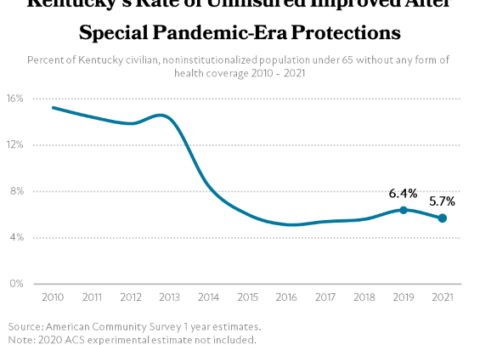States are nearing shortfalls that could be the largest on record – totaling over $500 billion in just over a fiscal year
While federal policymakers have begun providing fiscal relief to state and local governments to combat the COVID-19 pandemic, Kentucky and other states need much more in order to avoid spending cuts that would harm families, destabilize communities and deepen the recession, according to a new report from the Center on Budget and Policy Priorities. In the coming months, Kentucky’s revenues are expected to plummet – all while health and other costs related to the virus soar.
“As Kentucky has taken necessary and appropriate actions to protect public health, we’ve seen huge losses of jobs and the closing of businesses all across the state. Our ability to combat the virus and guard against further economic harm is in jeopardy as state revenues plummet and containment of COVID-19 leads to a spike in public costs,” said Jason Bailey of the Kentucky Center for Economic Policy. “Without much larger federal financial assistance, Kentucky will be forced to make dramatic budget cuts that will hurt communities and slow an eventual economic recovery.”
Even after accounting for the federal fiscal aid (the CARES Act) and states’ rainy day funds, states still face shortfalls of as much as $360 billion, not including the substantial new costs they face to combat the COVID-19 virus. After the Great Recession, states and localities made $290 billion in cuts that worsened economic and racial inequities and weakened the recovery.
Kentucky is in an especially vulnerable position because its rainy day fund is among the poorest-funded in the country, as Bailey explains here.
“The Medicaid increase and Coronavirus Relief Fund enacted by Congress were important first steps, but they fall far short. States need more to respond to their worsening budget problems and protect their residents,” explained report coauthor Elizabeth McNichol, Senior Fellow at the Center on Budget and Policy Priorities. “This recession is projected to be considerably deeper than the last one. If states don’t get substantially more relief, they will balance their budgets with cuts that damage education, unemployment systems, infrastructure, and other critical public investments for years to come.”
In the next round of aid, federal lawmakers should provide additional Medicaid funding and other forms of fiscal relief to states, territories, and tribes by:
- Further increasing the federal government’s share of Medicaid payments (FMAP); this increase should adjust with economic conditions and remain in place as long as unemployment remains high.
- Providing additional fiscal relief through an extended and flexible Coronavirus Relief Fund or other means.
- Providing aid to local governments as well.

